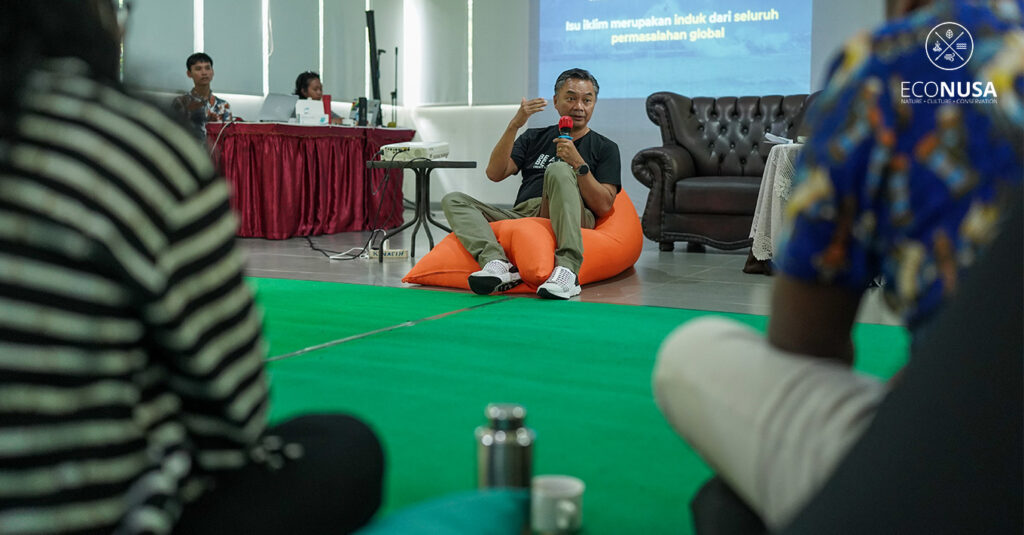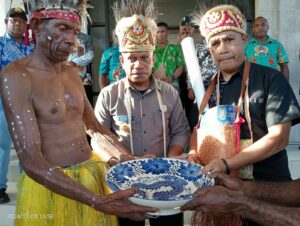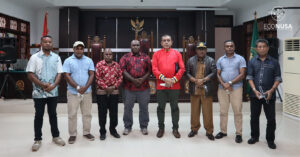
Upholding belief in collaborative change with the community is deemed the main capital for young diplomat. Such belief with certain knowledge mastery will leave out doubts among the stakeholders’ minds. Making a start from young people, a change will influence the history course in the future.
The statement was addressed by the founder of Foreign Policy Community of Indonesia, Dino Patti Djalal, before the participants of the 2022 National School of Eco Diplomacy (SED). Thirty six participants across from Indonesia enhanced their knowledge on critical thinking, public speaking, and diplomacy.
“The most progressive, the most courageous group is young people. If we are passionate with this goal, it will be easier. But if it does not believe, it would be hard, even if we wake up from sleep. Just measure what you want to change, instead of just a rhetorical. Following the change, it would be better to amplify it,” said Dino on Saturday, 27 August 2022, in Depok, West Java.
Dino said that young people has vital roles in every major event that marks an era of Indonesian history. The youngsters established an organization which later marks the national awakening. The youth pledge was then put language, nation, and homeland above the local archipelagic interests.
Read Also: 35 Indonesian Youths Prepared for Being Green Diplomat
Indonesia independence was inherent with the roles of youngsters when they observed the vacant power. Few years later, the young people took back the power and got social political reforms under way. Democracy is no longer taboo words to speak up.
As to Dino, youth currently has important role to mitigate global warming. The uncontrollable increase of earth temperature will omit the development plan gearing the hundred years anniversary of Indonesia. In 2045, demographic bonus with surplus of productive ages will be meaningless if the earth temperature exceeds the level targeted by the Paris Agreement in 2015.
“The DNA of your generation is net-zero world emission. We cannot think 2045 without taking climate change risk into consideration. All prides of the Indonesia 2045 would not be applicable. The challenge is very real. Warning signals from nature has been visible,” asserted Dino.
Read Also: Diplomacy Study via Social Media in National SED
The Conference of Parties in Paris made many countries agreed to keep the earth temperature from rising more than 1.5 Celsius degrees as from the preindustrial era. To meet the ambitious target here, one way to attain it is by making net zero emission by 2050.
The net-zero emission is the condition when carbon dioxide emission and other greenhouse gases equal to the natural carbon sequestration by earth. For instance, carbon dioxide absorbed by the vegetation photosynthesis. Whale serves also as the sequester of a large amount of carbon even if the mammalian here is drowned or dead.
Global Carbon Project mentioned that along 2010-2019 forests and other terrestrial ecosystems absorb 12.5 billion tons of emission equals to CO2 every year. Meanwhile, ocean absorbs 9.2 billion tons of emission equals to CO2 per year. The rest is piled up together in the atmosphere which brings about global warming.
Read Also: Enthusiasm of Mangrove Class at Jamnas XI 2022
The Intergovernmental Panel on Climate Change (IPCC) in its reports limits the peak of global emission by 2025. After that, many countries in the world should decrease their emissions up to 43 percent before 2030. Otherwise, the earth temperature will exceed 1.5 Celsius degrees.
Indonesia set the net-zero emission target by 2060 or even faster. The target is actually behind the 10 years schedule targeted by the Paris Agreement. In the Nationally Determined Contribution (NDC) document, the 2060 target could be attained even faster with the international support. The Coordinating Minister for Economic Affairs, Airlangga Hartarto, said that to meet the NDC, it requires Rp3,799 trillion funds.
Dino said the various conditions that are not ideal to meet the net-zero emission are deemed an opportunity as well as challenge to young people. By utilizing digital technology, green diplomacy is no longer restricted by space and time. The challenge remains when the Indonesian people have not been aware of climate change. “Even if they have already known, many still lack knowledge that this is a serious problem,” said Dino.
Read Also: EcoNusa and Kwarnas Pramuka Collaboratively Craft Leader with Ecological Concern
In addition to digital diplomacy, as to Dino, it is also important to preserve the existing natural resources. Forests and water ecosystems in Tanah Papua and Maluku Islands are the last frontiers of Indonesia in pursuit of net-zero emission. Besides, the natural resource in eastern Indonesia is also closely related to the community.
“Papua and Maluku Islands are the strategic carbon sequester for Indonesia and international world. The community relies greatly on the ecosystems for food and prosperity,” Dino asserted.
Dino expected that following the series of National SED, the participants could become smart and wise activists while upholding belief in various agendas of climate change mitigation. “For the participants, they could change their surrounding world, make it enthusiastically, and know how to achieve. When it happens, the program here is very beneficial to them and to various communities in Indonesia,” said Dino.
Editor: Leo Wahyudi







